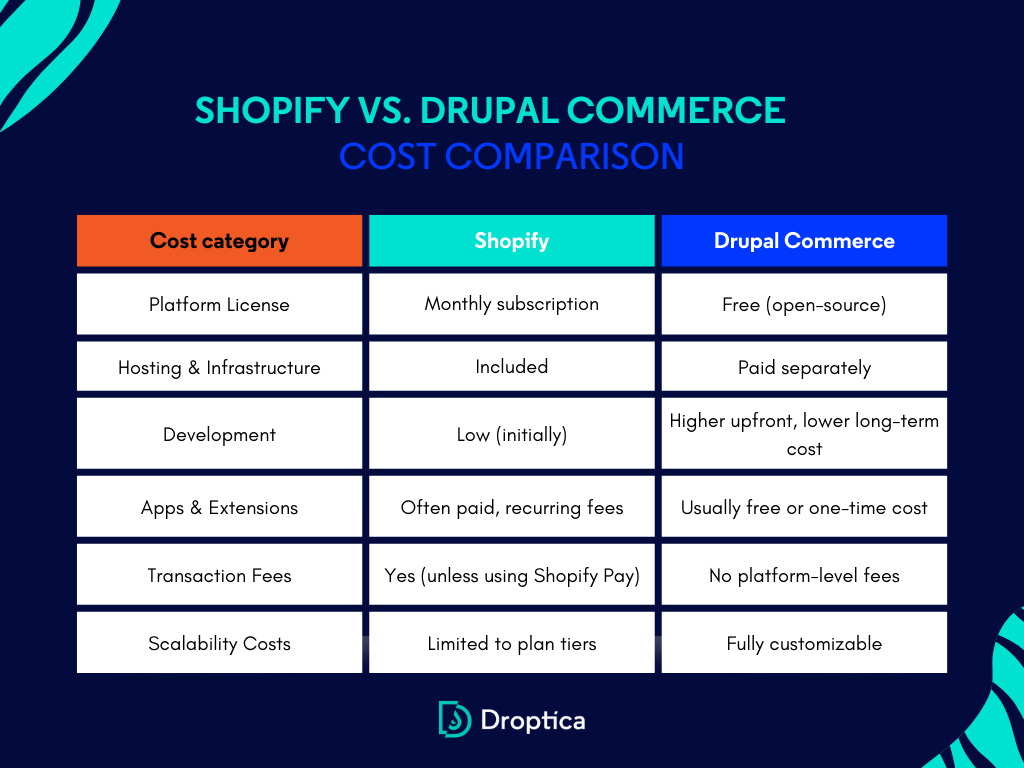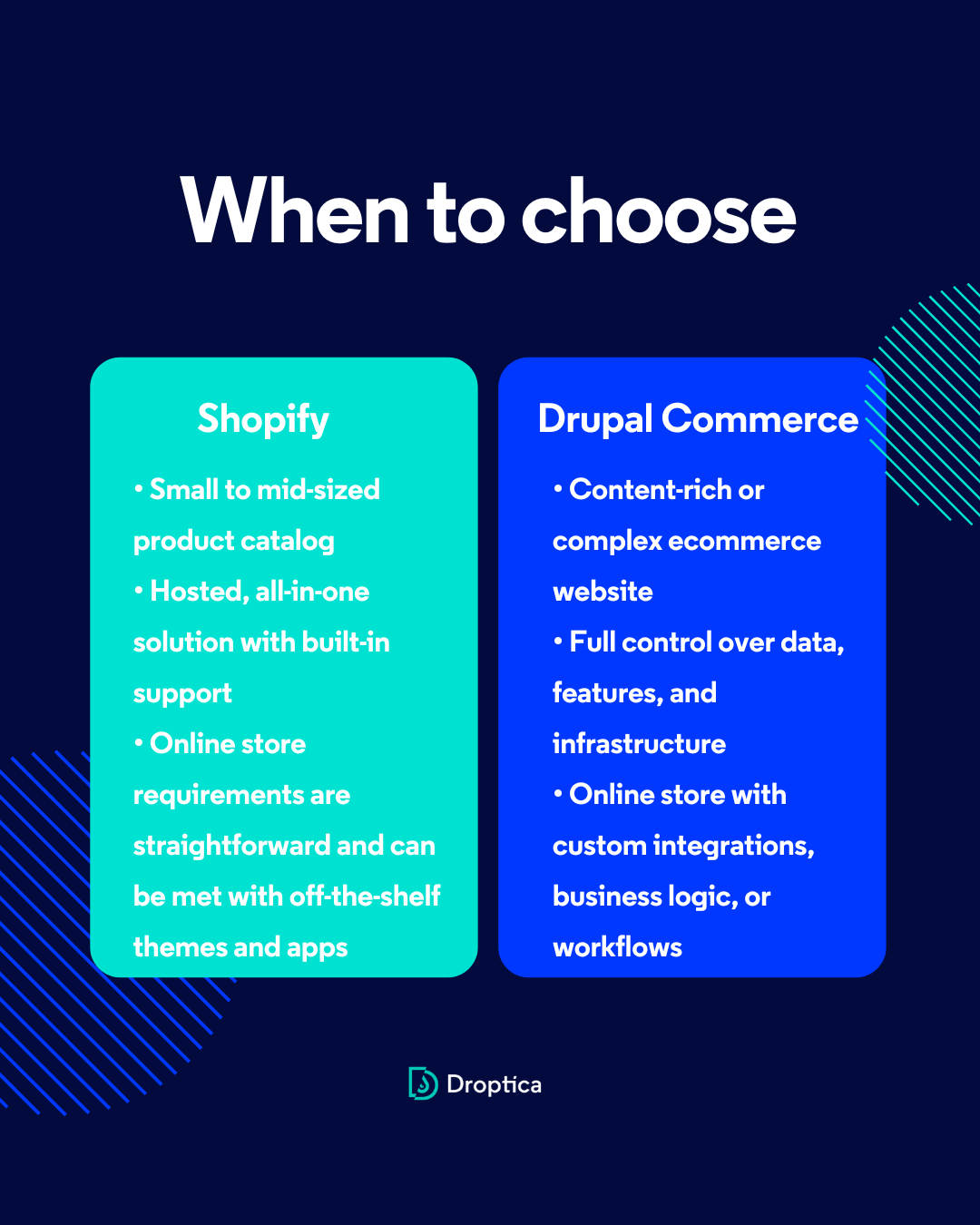
Want to launch a powerful ecommerce store tailored to your business needs? Shopify offers a quick and easy setup, while Drupal Commerce provides full flexibility and customization. However, choosing the wrong platform can lead to limitations in scalability, costs, or functionality. In this article, we compare Shopify and Drupal Commerce to help you make an informed decision based on your business goals.
In this article:
- Overview of Shopify and Drupal Commerce
- Ease of use & setup
- Customization & flexibility
- Control over the online store and data
- Scalability & performance
- Cost comparison
- Security & compliance
- SEO & marketing features
- Multilingual & global support
- Advanced content management (CMS)
- Integrations & extensions
- Support & community
- When to choose Shopify vs. Drupal Commerce?
Overview of Shopify and Drupal Commerce
When it comes to building an online store, Shopify and Drupal Commerce are two very different platforms with unique strengths. Let's explore the basic differences between these tools.
Shopify - general information
Shopify is a proprietary, all-in-one ecommerce solution that allows users to quickly create and launch an online store without needing technical expertise. It’s a hosted platform, which means Shopify takes care of the infrastructure, hosting, security, and updates. Its user-friendly interface and large app ecosystem make it a popular choice for entrepreneurs and small to medium-sized businesses looking to get to market fast.
Drupal Commerce - general information
Drupal Commerce, on the other hand, is an open source ecommerce framework built on top of Drupal content management system. It offers unmatched flexibility and is ideal for businesses that need full control over their store’s functionality, content, and design. Unlike Shopify, Drupal Commerce requires a more technical setup, but in return, it enables deep customization, complex integrations, and enterprise-level scalability.
Ease of use & setup
One of the first things businesses consider when choosing an ecommerce platform is how easy it is to get started. Shopify and Drupal Commerce differ significantly in this area.
Shopify
Shopify is designed with simplicity in mind. It offers a guided setup process, an intuitive admin interface, and drag-and-drop functionality that allows non-technical users to launch an online business quickly. Hosting, security, and updates are all handled by Shopify, so there’s no need to worry about technical maintenance. You can start selling products within hours.
Drupal Commerce
Drupal Commerce, however, is more complex and developer-oriented. Because it’s built on Drupal, the setup process typically requires technical expertise, including configuring modules, customizing themes, and possibly integrating third-party systems. It’s not a plug-and-play solution—but that’s also its strength. You aren’t limited by templates or rigid structures. If your online store requires custom logic, tailored workflows, or advanced content structures, Drupal Commerce gives you the tools to build exactly what you need.
In summary:
- Shopify is great for speed, ease, and non-technical teams.
- Drupal Commerce is ideal for projects where customization, control, and scalability are more important than ease of setup.
Customization & flexibility
Customization is where the gap between Shopify and Drupal Commerce becomes especially clear. The ability to tailor your online store to fit specific business needs can be a critical factor in choosing the right ecommerce platform.
Shopify
Shopify offers a controlled environment with a limited but polished set of customization options. Users can choose from pre-designed themes and customize them using the built-in editor or, for more advanced tweaks, with access to the Liquid templating language. However, the core structure of Shopify is locked down, and extensive customization—especially outside the typical ecommerce flow—can be restricted or require workarounds. Extensions and apps from the Shopify App Store can help, but they often come at an additional monthly cost and may not cover every unique business need.

Customization of theme in the Shopify store. Source: Shopify.
Drupal Commerce
Drupal Commerce, in contrast, is built for full flexibility. Because it’s part of the Drupal ecosystem, every part of your store—products, checkout flow, customer data, content presentation—can be customized. You can create completely unique user experiences, integrate complex business logic, and design your store structure exactly how you want it. Whether you need a content-rich product catalog, multilingual product pages, or dynamic pricing rules, the Drupal Commerce platform lets you build it without being boxed in.
In summary:
For businesses that want full control over the user journey and functionality—or have evolving requirements—Drupal Commerce is the better choice. For those who prefer speed and simplicity over extensive customization, Shopify will be more than sufficient.
Control over the online store and data
Control over your ecommerce platform and customer data can have a major impact on your long-term strategy—especially when it comes to privacy, compliance, and ownership.
Shopify
Shopify operates as a fully hosted SaaS (Software as a Service) platform. While this makes it easier to manage technical aspects like hosting, updates, and security, it also means that you’re operating within Shopify’s infrastructure and limitations. You don’t have access to the server or database, and while you can export some data (like orders or customer lists), full control over how data is stored, processed, and accessed is limited. For businesses in regulated industries or with strict data policies, this lack of control can become a challenge.
Drupal Commerce
Drupal Commerce, on the other hand, gives you complete ownership of your online store and its data. You choose your hosting provider, manage your database, and control every aspect of how your ecommerce system is structured and operates. This is especially valuable for businesses with custom workflows, strict compliance requirements (such as ISO27001 or GDPR), or a need to retain full ownership of customer information and business logic.
Additionally, with Drupal Commerce, there are no platform lock-ins. You aren’t tied to a vendor’s roadmap, pricing, or policies. You decide when to upgrade, how to scale, and what technologies to integrate. It’s your infrastructure, your rules.
In summary:
- Shopify simplifies store management at the cost of limited backend and data control.
- Drupal Commerce provides full control and flexibility for businesses that prioritize ownership, customization, and data sovereignty.
Scalability & performance
As your business grows, your ecommerce website needs to keep up—whether that means handling more traffic, expanding product catalogs, or supporting new ecommerce features and workflows. Both Shopify and Drupal Commerce offer scalability but in very different ways.
Shopify
Shopify is built for fast-growing small and medium-sized businesses. It handles hosting and performance optimization behind the scenes, so you don’t have to worry about server infrastructure or load balancing. Traffic spikes, seasonal sales, and large volumes of transactions are managed by Shopify’s cloud infrastructure. However, there are limitations to how much you can scale in terms of custom functionality. As your needs become more complex—such as multi-store setups, headless architectures, or advanced API integrations—you may hit the ceiling of scalability Shopify can offer.
Drupal Commerce
Drupal Commerce shines in scenarios where custom scalability is required. Since it’s self-hosted and open source platform, you have full control over performance tuning and infrastructure. You can choose your tech stack, configure caching strategies, optimize database performance, and implement scalable hosting solutions (like Docker, Kubernetes, or cloud-native architectures). Drupal Commerce is particularly well-suited for enterprise-level platforms, large product catalogs, and content-heavy commerce experiences.
It’s also worth noting that with Drupal's API-first approach, it’s easy to build headless commerce solutions or integrate with frontend frameworks and third-party systems—without sacrificing performance.
In summary:
- Shopify is easy to scale for typical business growth and high-traffic events.
- Drupal Commerce offers limitless scalability for complex, custom, or enterprise-grade ecommerce ecosystems—when supported by the right technical expertise.
Cost comparison
Cost is often a deciding factor when choosing an ecommerce platform—but it’s important to look beyond just the upfront price and consider the total cost of ownership (TCO) over time.
Shopify
Shopify uses a subscription-based pricing model, with monthly plans starting from a basic tier up to more advanced options for larger businesses. While the entry cost is relatively low and includes hosting, SSL, and security, additional costs can add up quickly. Many advanced features—such as comprehensive reporting, custom workflows, or multilingual support—require paid apps or third-party integrations. Also, Shopify charges transaction fees unless you use its own payment system (Shopify Payments).
Drupal Commerce
As an open source platform, Drupal Commerce has no licensing or subscription fees. However, it does require an initial investment in development and hosting. You’ll need a team—either in-house or through a Drupal agency like Droptica—to set up, maintain, and evolve your online store. That said, you won’t be paying for every new feature or customization you need through app subscriptions. Over time, this model can be more cost-effective—especially for businesses with complex needs or high revenue volumes.
Here’s how it typically breaks down:

In summary:
- Shopify is cost-effective for simple stores and fast launches, but long-term costs can add up with app fees and platform limitations.
- Drupal Commerce requires more investment upfront but gives you full control and potentially lower TCO over time for complex or growing businesses.
Security & compliance
Security is non-negotiable in ecommerce. From protecting customer data to ensuring compliance with international regulations, your platform needs to provide both peace of mind and flexibility to meet evolving standards.
Shopify
Shopify takes care of most security concerns for you. As a hosted SaaS platform, it includes built-in SSL certificates, PCI-DSS compliance, and regular updates. This makes it a solid option for businesses that want to offload the responsibility of infrastructure security. However, Shopify’s closed ecosystem also means limited visibility and control over backend processes—making it harder to implement custom compliance measures or security protocols specific to your industry or region.
Drupal Commerce
Drupal Commerce, on the other hand, offers full control over security and compliance. You manage the hosting environment, server configuration, data handling policies, and security practices. This level of control is crucial for businesses in regulated industries (finance, healthcare, government) or operating across borders where compliance with frameworks like GDPR, ISO27001, or HIPAA is mandatory.
The Drupal community is also highly proactive in addressing vulnerabilities. The Drupal Security Team regularly releases updates and advisories. And the mature, modular architecture of this system allows for secure configuration and access control at every level of the application.
In summary:
- Shopify handles most security for you—great for standard needs, but with limited customization.
- Drupal Commerce requires more responsibility but provides the control needed for enterprise-grade security and compliance.
SEO & marketing features
Driving traffic and converting visitors are at the heart of any successful ecommerce strategy. That’s why SEO and marketing capabilities should be key considerations when choosing between Drupal vs. Shopify.
Shopify
Shopify includes a solid set of built-in SEO features—such as customizable meta titles, URLs, alt text, and sitemaps—making it easy for site owners to follow basic SEO best practices. It also integrates well with Google Analytics, Facebook Pixel, and a variety of marketing automation platforms. However, more advanced features (like structured data customization, multilingual SEO, or content-driven landing pages) often require third-party apps, which may come with additional costs or limitations.
Drupal Commerce
Drupal Commerce, powered by Drupal’s enterprise-grade CMS, offers far more advanced and granular SEO capabilities. You can control every aspect of your site’s structure, metadata, schema markup, and multilingual SEO setup. It’s particularly well-suited for content-rich marketing strategies—such as blogs, landing pages, product storytelling, and localized campaigns. With modules like Metatag, Pathauto, Schema.org, and SEO Checklist, Drupal provides everything needed to build a highly optimized and scalable SEO architecture.
On the marketing side, Drupal Commerce allows deep integrations with CRMs, email marketing platforms, analytics tools, and marketing automation systems. You can also personalize content and user journeys based on behavior, location, or customer profile—something that’s harder to achieve natively in Shopify without premium apps or workarounds.
In summary:
- Shopify offers built-in SEO and marketing tools that are simple and effective for most standard ecommerce needs.
- Drupal Commerce excels for businesses that prioritize content marketing, advanced SEO strategies, and personalization.
Multilingual & global support
For businesses targeting international markets, the ability to offer localized content, currencies, and user experiences is crucial. This is where multilingual and global support capabilities can make or break your online business.
Shopify
Shopify provides basic multilingual support, but it comes with some limitations. While Shopify does support multiple languages through Shopify Markets and compatible themes, creating a fully localized experience often requires third-party apps or workarounds. These tools can help translate content and manage currencies, but they may not offer full control over URL structure, SEO metadata, or region-specific logic. Additionally, managing large-scale international stores with complex localization needs can become cumbersome within Shopify’s framework.
Drupal Commerce
Drupal Commerce, in contrast, is built from the ground up for multilingual and multinational experiences. Drupal’s core includes powerful language handling features—such as content translation, interface translation, language-specific paths, and language negotiation. You can easily deliver content in multiple languages with complete control over how each version is structured and displayed.
Moreover, Drupal Commerce supports regional tax rules, currencies, and shipping configurations, making it ideal for businesses operating in multiple countries. Whether you're selling across Europe, North America, or the Middle East, you can create customized experiences for each audience without relying on external apps.
In short:
- Shopify works for basic multilingual setups, but advanced localization often requires extra tools and compromises.
- Drupal Commerce is the superior choice for fully customizable, scalable, and SEO-friendly global ecommerce experiences.
Advanced content management (CMS)
In today’s ecommerce landscape, selling isn’t just about products—it’s about content-driven experiences. From blogs and landing pages to customer stories and dynamic content blocks, a strong content management system (CMS) is key to engaging users and improving SEO. This is an area where Shopify and Drupal Commerce differ significantly.
Shopify
Shopify websites include basic CMS functionality that is suitable for simple content needs. You can create pages, blog posts, and product descriptions, but the content types are limited and not deeply customizable. While it's sufficient for straightforward Shopify stores, it lacks the depth and flexibility required for rich content strategies like structured editorial content, user-generated content, or content personalization. To go beyond basic capabilities, merchants often rely on third-party apps or plugins.
Drupal Commerce
Drupal Commerce, built on the powerful Drupal CMS, offers enterprise-level content management out of the box. You can create unlimited custom content types, define complex relationships between content, and manage workflows tailored to your editorial team. Whether you're running a product-focused blog, launching localized marketing campaigns, or building interactive landing pages—Drupal gives you full control.

Page with recipes on the Develey website on Drupal Commerce, developed by Droptica.
Features like content moderation, revision tracking, multilingual content management, and flexible layout-building tools (such as Layout Builder or Paragraphs) make Drupal Commerce ideal for businesses that treat content as a strategic asset.
In summary:
- Shopify is product-first with limited CMS capabilities—fine for simple ecommerce websites.
- Drupal Commerce is content-first, offering a robust, flexible, and scalable CMS for businesses that want to combine storytelling and selling.
Integrations & extensions
A modern ecommerce platform rarely operates in isolation. It needs to connect with marketing tools, CRMs, ERPs, payment gateways, shipping providers, analytics platforms, and more. The ability to integrate seamlessly with third-party services and extend platform functionality is critical for long-term success.
Shopify
Shopify offers a large and well-maintained App Store with thousands of ready-made integrations. From email marketing and loyalty programs to dropshipping and SEO tools, many apps can be installed in a few clicks—making it easy for non-technical Shopify users to enhance their store. However, most apps come with recurring monthly fees, and customization options can be limited. For businesses with complex workflows or niche requirements, Shopify's closed ecosystem may feel restrictive.
Drupal Commerce
Drupal Commerce, being open source and API-first, provides virtually unlimited integration possibilities. You can connect to any external system using REST, GraphQL, or custom APIs. Whether you need to sync with a custom ERP, build a headless frontend, or integrate with regional logistics providers, Drupal gives you complete control.
Additionally, Drupal’s modular architecture allows developers to extend or override almost any feature of the platform. This is particularly useful for enterprises that rely on custom back-office processes, advanced pricing engines, or unique business logic that off-the-shelf platforms can’t support.
In summary:
- Shopify offers quick and easy integrations through its App Store, great for standard use cases.
- Drupal Commerce is ideal for custom, complex, or enterprise-grade integrations, with no platform limitations.
Support & community
Reliable support and an active community can make a big difference in how smoothly your ecommerce platform operates—especially when you encounter technical challenges or need to scale quickly.
Shopify
Shopify offers dedicated customer support as part of its subscription plans. You can reach out to Shopify’s 24/7 support via chat, email, or phone for help with technical issues, billing, or general questions. Additionally, Shopify’s ecosystem includes extensive documentation, tutorials, and a large community forum. This makes it easy for merchants—especially those without a technical team—to get assistance quickly. However, if your issue involves heavy customization or falls outside of Shopify’s ecosystem, support may be limited in what it can do.
Drupal Commerce
Drupal Commerce is backed by the global Drupal open source community, which includes thousands of active developers, contributors, and specialized agencies. While there’s no centralized support team like Shopify’s, you gain access to a vast pool of technical knowledge via Drupal.org, Stack Overflow, GitHub, and community Slack channels. For professional, dedicated support, businesses often partner with experienced Drupal agencies like Droptica, who provide tailored development, maintenance, and consulting services.
This model is particularly valuable for complex or enterprise-grade stores, where ongoing support means more than just troubleshooting—it involves continuous improvement, performance tuning, website security updates, and feature evolution.
In summary:
- Shopify provides direct, structured support that’s ideal for simpler stores and non-technical users.
- Drupal Commerce offers access to a robust, collaborative community and specialized agency support—perfect for businesses that need custom solutions and long-term technical partnerships.
When to choose Shopify vs. Drupal Commerce?
Both Shopify and Drupal Commerce are powerful platforms—but they serve different needs. The right choice depends on your business goals, technical knowledge and capabilities, and how much control and flexibility you need.

Choose Shopify if:
- You need to launch an online store quickly with minimal setup.
- You have a small to mid-sized product catalog.
- You prefer a hosted, all-in-one solution with built-in support.
- You have limited technical resources and want a platform that "just works."
- Your online store requirements are straightforward and can be met using off-the-shelf themes and apps.
Shopify is ideal for businesses that value ease of use, low maintenance, and speed to market. It’s especially popular with startups, entrepreneurs, and small businesses looking to get online without a dedicated tech team.
Choose Drupal Commerce if:
- You need full control over your data, ecommerce features, and infrastructure.
- You’re building a content-rich or complex ecommerce experience.
- Your online store requires custom integrations, business logic, or workflows.
- You operate in regulated industries or across multiple countries with strict compliance needs (e.g., ISO27001, GDPR).
- You plan to scale significantly and want a flexible, future-proof foundation.
Drupal Commerce is best suited for medium to large businesses, enterprises, or organizations that see ecommerce as part of a larger digital ecosystem—one that integrates content, user experiences, and complex backend operations.
Need a custom online store? At Droptica, we specialize in Drupal Commerce development services, building robust shops from scratch. We’ll help you plan the architecture of your ecommerce store and choose the best hosting option. Then, we’ll create the final solution that we can later maintain to ensure continuous security and uninterrupted performance.











